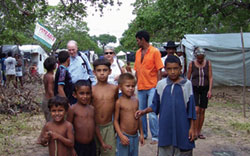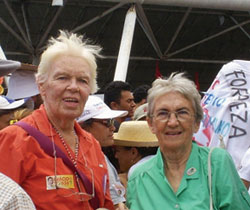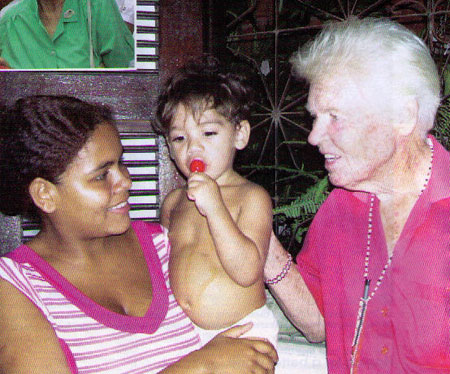Dreams find fulfillment
The last chapter in the saga of the mfamilies of Uruanan who for 18 months have struggled to gain land ownership – a necessity for life
By Sr. Clarice Garvey, O.L.M.
May 2007
Return to Table of Contents
Print Article
How long have I waited for the day when I could write the last chapter of the saga of the people of Uruanan. At several meetings over the past 18 months with the people responsible for agrarian reform, it seemed that all the documents were prepared with the necessary signatures to be sent to Brasilia, the capital. It is from here that permission would come allowing 600 families to move onto and to call home an 11,000 hectare caju (cashew) farm.

Sr. Clarice Garvey stands beside Raimundao, a community leader. These people are part of a group of 700 families who are camped on a roadside in Chorozinho, Ceara. They await final government approval for ownership of Uruanan, an 11,000 hectare caju farm. Also pictured is Mr. Marius deBruyn, a visitor from Canada.
This story began in December 2004 with a meeting of eight farmers and four of us from support groups, including the Land Pastoral Team. This gathering of people with a dream was held under a caju tree in a backyard.
At that meeting the farmers with great hope as well as many doubts committed themselves to encouraging their neighbours, families and friends to join them in a struggle to become shareowners of an 11,000-hectare caju farm. This farm borders the properties where for the past two or three generations these people have lived as tenant farmers. Also at the meeting were some members of the Institute for Agrarian Reform who promised help. Meetings with this government agency were set up and negotiations with the landowner for ownership began.
The seeds of that possibility were well fertilized and irrigated during a long rainy season and by October 2005 the harvest was ready. This courageous group had grown to 700 families. Carrying what they could of the necessities for tent life, they walked to the roadside bordering the property they hoped would one day be theirs. Setting down their belongings, they built their tents. These determined landless people now began a life deprived of what most people consider essentials, persisting through torrential rains and 33-degree heat.

Sr. Clarice Garvey stands beside Raimundao, a community leader. These people are part of a group of 700 families who are camped on a roadside in Chorozinho, Ceara. They await final government approval for ownership of Uruanan, an 11,000 hectare caju farm. Also pictured is Mr. Marius deBruyn, a visitor from Canada.
They came from four municipalities, already organized into groups, each with its own coordinators. The Land Pastoral team was there to welcome them and to help them get settled. Not an easy life but their hopes were high and their joy infectious. As tenant farmers they had experienced poverty and they were out to make history in this place.
It was one precious moment among many.
During the following months the support groups visited and offered courses in leadership, handicrafts, production, marketing, as well as the spirituality of working with land and water. Their favourite scripture passages were those about God's promise of a land flowing with milk and honey. Local school buses took the children to regular classes. The government provided basic food. They carried water from a well some 300 metres away. Life went on.
A few priests visited and celebrated Eucharist with them. These celebrations were special moments when people shared their gratitude for God's presence and committed themselves to continuing the struggle for agrarian reform.
Several times they traveled to the city of Fortaleza to meet with the government team regarding the progress of negotiations. Their patience was strong but they never wavered in their position as people with rights.
I began this article referring to the end of a saga that I had hoped would be soon completed. But I know now that the documents have not yet been signed. I know too, and the people know, that as surely as our Jewish ancestors arrived at the promised land because of their faith in God's promise, this story will not end in the desert of the roadside. It will end in a land of caju and corn and beans and wells of fresh water. The last chapter will be written. Such dreams find fulfillment.

Sr. Mona Kelly with Regelane and her baby Julios C.sar. Sr. Mona continues her activities at GDFAM, an organization offering support to families. They conduct courses to help mothers and young people become wage earners, and provide activities for youth to keep them off the streets. After her baby was born Regelane took a sewing course at the centre and is now able to support herself and her child. Regelane has said that in appreciation for the assistance that was given to her and her family these many years, she will offer her help to a friend who has two children and is physicially handicapped.
Recently the directorship of the Little Libraries, a literacy initiative that Sr. Mona was instrumental in founding in the community, has been assumed by local women. As well, twice a week Sr. Mona joins other pastoral workers, including Scarboro lay missioner Beverly Trach, to meet with women, homeless children and youth in public parks and bus terminals, their favourite hangouts. These informal meetings build friendships and open doors to stories of a lifetime of pain, abuse, hunger and rejection, as well as stories of hope and genuine concern for each other.
Return to Table of Contents
Print Article